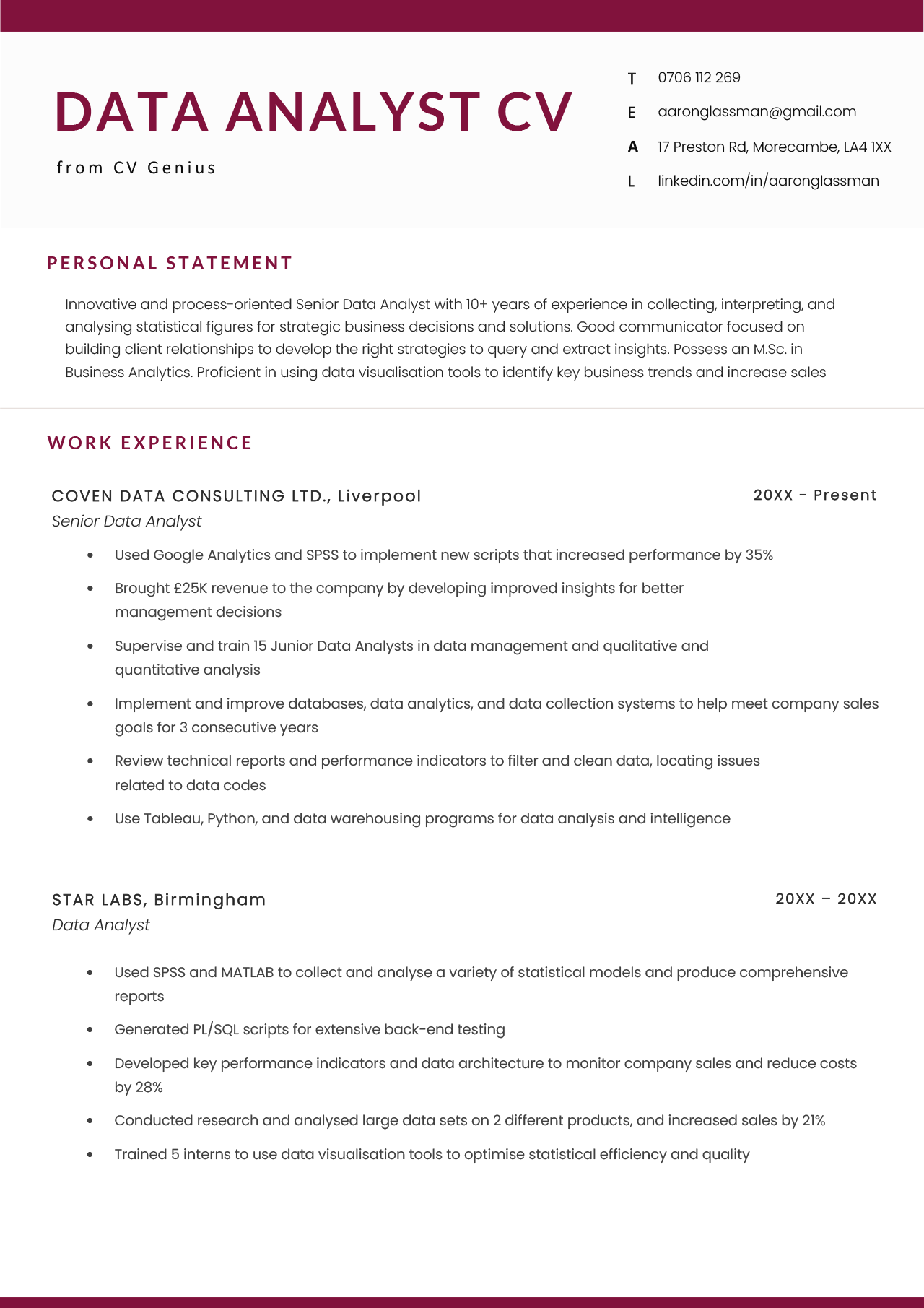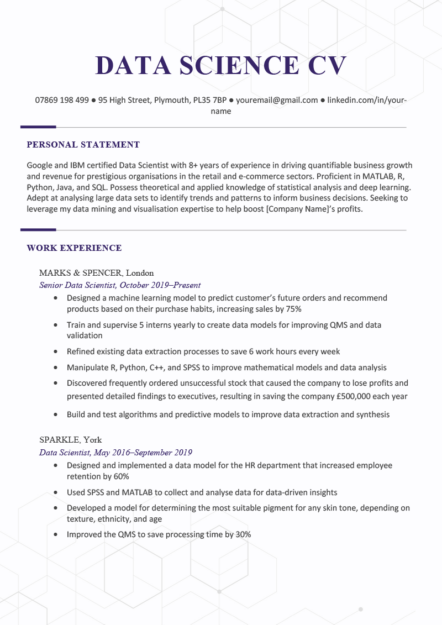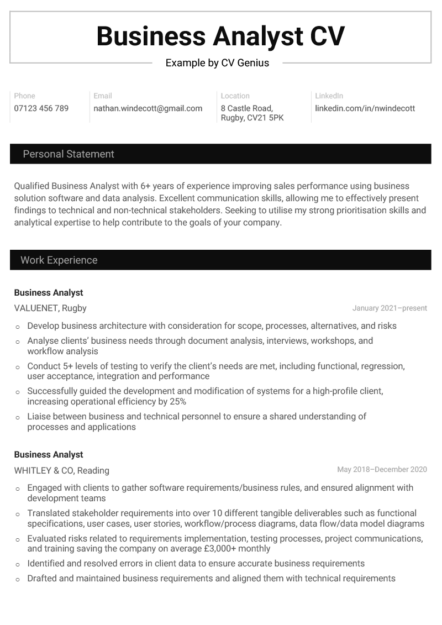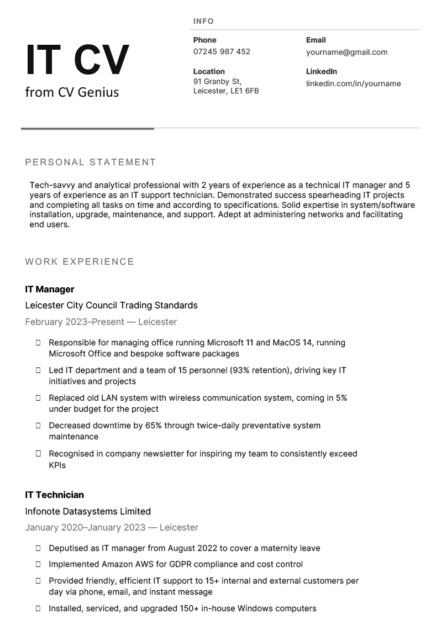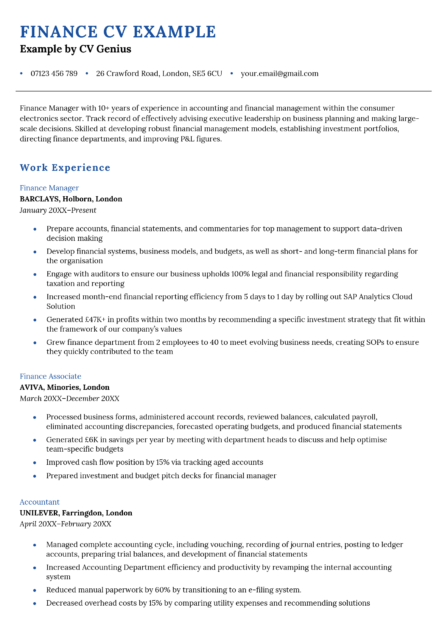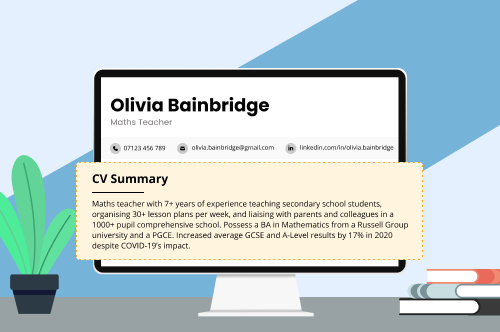Ensure your CV layout is structured to best highlight your unique experience and life situation.
Data Analyst CV Template (Text Format)
PERSONAL STATEMENT
Innovative and process-oriented Senior Data Analyst with 10+ years of experience in collecting, interpreting, and analysing statistical figures for strategic business decisions and solutions. Good communicator focused on building client relationships to develop the right strategies to query and extract insights. Possess an M.Sc. in Business Analytics. Proficient in using data visualisation tools to identify key business trends and increase sales and productivity.
WORK EXPERIENCE
Coven Data Consulting LTD., Liverpool
Senior Data Analyst, 2018 – Present
- Used Google Analytics and SPSS to implement new scripts that increased performance by 35%
- Brought £25K revenue to the company by developing improved insights for better management decisions
- Supervise and train 15 Junior Data Analysts in data management and qualitative and quantitative analysis
- Implement and improve databases, data analytics, and data collection systems to help meet company sales goals for 3 consecutive years
- Review technical reports and performance indicators to filter and clean data, locating issues related to data codes
Star Labs, Birmingham
Data Analyst, 2015 – 2018
- Used SPSS and MATLAB to collect and analyse a variety of statistical models and produce comprehensive reports
- Generated PL/SQL scripts for extensive back-end testing
- Developed key performance indicators and data architecture to monitor company sales and reduce costs by 28%
- Conducted research and analysed large data sets on 2 different products, and increased sales by 21%
- Trained 5 interns to use data visualisation tools to optimise statistical efficiency and quality
Tech Hub, Liverpool
Research Analyst, 2013 – 2015
- Organised and analysed data using Excel functions
- Received accolades from the manager for identifying trends and offering recommendations for improvement
- Collaborated with superiors to collect, interpret, and compile data in an organised manner
- Presented 3 detailed reports each week to senior analysts, enumerating developments with the company’s projects
EDUCATION
University of Oxford, 2011-2012
MSc in Business Analytics, first-class honours
University of Oxford, 2006-2011
BSc (Hons) Statistical Science, upper second-class honours (2:1)
Relevant Modules: Business Intelligence Systems, Concepts & Methods; Research Methods; Data Mining Techniques and Applications; Analytics Programming; Data Warehouse Design and OLAP
Dissertation Topic: Big data analytics and its impact on marketing strategy
Bay Leadership Academy, Morecambe, 2000-2006
A-levels: Maths (A), Physics (A), Computer Science (A)
GCSEs: 10 A-C including Maths, English, Computer Science, Business Studies, and Physics
KEY SKILLS
Critical Thinking – Data Visualisation – Machine Learning – Microsoft Excel – Structured Query Language (SQL) – R – Python – Communication skills
HOBBIES & INTERESTS
Coding – Dancing – Reading – Public Speaking
How to write a job-winning data analyst CV
Before you begin writing, make sure you know how to write a CV in a way that best emphasises your strengths.
Data analysts belong to the family of data management roles, which also includes data engineers and data scientists. While data engineers prepare data for analysis and data scientists create algorithms and models to solve problems, data analysts focus on using big data to find trends and make predictions.
Since 2018, UK job postings for data analysts have risen by 231%. As a result, it’s a good time to apply for and land a data analyst job.
Data analysts are in such high demand because they have highly transferable skills. Sectors that need data analysts include:
- business intelligence
- finance
- legal
- marketing
- sales
- economics
- trading
- higher education
No matter your field, follow our four tips to write an outstanding data analyst CV:
1. Research the data analyst job
Customise your data analyst CV by first researching your target role. Tailoring your CV to a specific job shows recruiters that you fit their needs and that you care enough about working at their company to put in the effort.
The type of company you’re applying to can tell you the:
- kind of data you’ll be analysing
- hard skills you’ll need
- end goals of your analysis
- subject matter expertise that’s recommended (but usually not required)
Once you have this information, use it to customise the following sections of your data analyst CV:
- personal statement
- work experience
- skills
In addition to discussing relevant work experience and skills, use exact phrasing — or keywords — from the job posting to quickly show busy recruiters you match their requirements.
Make it easy to format your CV by choosing a CV template you can fill in.
2. Write a compelling data analyst CV personal statement
Your data analyst CV’s personal statement should summarise who you are as a worker and what you bring to the company. Additionally, personal statements are especially important for convincing employers to consider your application if you have limited work experience or recently changed careers.
In your personal statement, include:
- unique CV adjectives to describe yourself
- your most job-relevant skills and experience
- the name of the target company
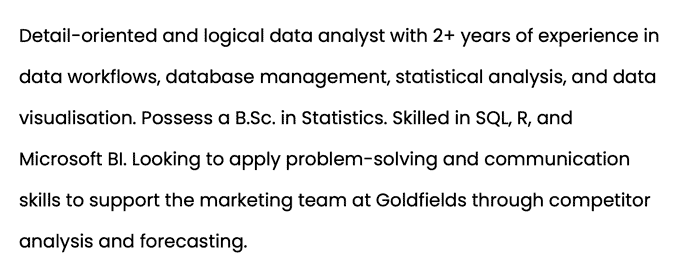
3. Be specific throughout your data analyst CV
Be as detailed as possible on your data analyst CV, especially in your skills and work experience sections, by both clarifying vague phrases and adding numbers.
Work experience section
Quantify your work experience to show recruiters what you’ve accomplished. As a data analyst, you can incorporate numbers like the ones below into your experience bullets:
- Data dimensions
- Outcome of your data analysis
- Time saved by implementing a new or different workflow
- Number of reports generated within a certain time period
- Number of projects managed at one time
Another way to provide detail about your work experience is to discuss your specific achievements. As a data analyst, your achievements might include:
- Kaggle competitions you participated in
- publications
- projects completed in school or in your free time (especially for those who lack work experience)
List your Github in your data analyst CV’s contact information so that hiring managers can learn more about the projects you’ve completed.
Skills section
While your skills section shouldn’t take up too much space, provide specifics for your skills to give employers a better sense of what you can do. For example, rather than writing ‘data analysis and workflows’, you might say ‘performed A/B testing’ or ‘linear regression’ or ‘data cleaning to remove outliers and empty values’.
4. List in-demand data analyst skills
Data analysis is a highly technical field. As a result, data analysts need a robust set of hard skills, or skills learned through education and formal training. Common hard skills to list on your data analyst CV include:
- data quality assurance, validation, and standardisation
- data modelling, cleansing, and enrichment
- report generation and data visualisation (e.g., Tableau, Microsoft Power BI)
- checking prospective data sources
- database management
- advanced Microsoft Office skills
- data query languages (e.g., SQL)
- programming languages (e.g., Python, Java)
- statistical programming languages (e.g., R, SAS)
- Google Analytics
- Microsoft Azure
- trend analysis
- identifying when pre-existing patterns or new patterns can be reused for future cases
- data analysis conforming to the six data quality dimensions (accuracy, completeness, consistency, timeliness, uniqueness, and validity)
- maths skills
- providing forecast insights and recommendations based on data analysis
- competitor analysis
- machine learning algorithms and techniques such as clustering, regression, and classification
Once data analysts have examined data, they need to communicate what they’ve found to others. Doing so requires key soft skills, or personality traits that influence how people interact with others and approach work. Important soft skills for data analysts include:
- Communication skills (including with non-technical people)
- Critical thinking skills
- Project management
- Attention to detail
- Decision-making
- Time management skills
- Creativity
- Leadership
Do these writing tips seem a bit complex? Use a CV builder to simplify the CV-writing process — you’ll also find cover letter builders online so you can complete your job application.
